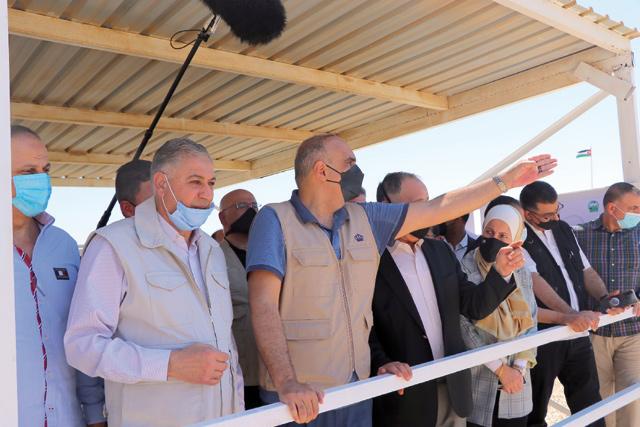- Local News
- Sun-2021-06-27 | 02:38 pm

Nayrouz News Agency :
Prime Minister and Minister of Defence Bisher Al Khasawneh on Saturday toured the southern Jordan Valley as part of his recent field visits and tours to a number of regions in the Kingdom, the Jordan News Agency, Petra, reported.
Khasawneh was accompanied by the Minister of Water and Irrigation Muhammad Najjar, Minister of Agriculture Khalid Hneifat and the Minister of State for Follow-up and Government Coordination Nawaf Tall, Minister of Youth Mohammad Al Nabulsi, Minister of Interior Mazen Faraya, Minister of Health Feras Al Hawari, and the administrator of the southern Jordan Valley Brig. Khaled Qudah.
The prime minister checked on major public projects in the region, which were implemented to fight poverty and unemployment.
Khasawneh affirmed that the government, under the directives of His Majesty King Abdullah, is intensifying field work, to get acquainted with the reality of services provided to people and work to improve them.
He pointed to the government's awareness of the challenges facing people in the Jordan Valley, highlighting the need to focus on production and service projects that contribute to providing solutions to the problems of poverty and unemployment.
The PM’s visit included Ghor Al Safi Youth Sports and Cultural Club, Ghor Al Safi Public Hospital, Al Yusr agricultural project for the production of the Moringa tree, and the Ibn Hammad Dam project.
The tour began with a visit to the Ghor Al Safi Youth Club where Khasawneh was briefed on the club which, in cooperation with the Jordan River Foundation, managed to support 250 projects that varied between small agricultural projects, support for students’ education, and the establishment of groceries and beauty parlours.
Khasawneh toured the club's facilities, which includes a multi-purpose hall and a football field, which entered the Guinness Book of Records as the lowest stadium on earth, Petra reported.
He instructed the Ministry of Public Works and Housing to visit the club as soon as possible to see the reality of the five-a-side football stadium and carry out the necessary maintenance in cooperation with the concerned authorities.
Conversing with a group of Ghor Al Safi youth, he listened to their needs and demands, which focused on the necessity of establishing development and service projects and supporting pioneering initiatives and projects.
During his visit to the Ghor Al Safi Public Hospital, the prime minister examined the medical and treatment services provided by the hospital to the district, which has an approximate population of 60,000 people.
Talking to the medical and nursing staff, the prime minister expressed his thanks and appreciation for the efforts they are making in providing healthcare services to patients.
Khasawneh also affirmed his appreciation of the great sacrifices made by the "White Army" in confronting the COVID pandemic, pointing to the need for everyone to adhere to preventive measures.
The prime minister visited Al Yusr agricultural project in the Ghor Al Mazraa area to plant the Moringa tree, which is known as the Arabica milk tree, the Yusr tree, and the pharmacy tree.
The project, located on an area of 30 dunums, is based on the cultivation of the Moringa tree, which is rich in nutrients, and its dried leaves are used as hot drinks as well as cosmetics.
The project aims to employ the residents of the southern Jordan Valley.
The project contributed to the planting of more than 10,000 Moringa trees and a thousand healthy and environmentally beneficial aloe vera plants, which can withstand high temperatures, and grow without the need for regular irrigation.
The project provides 65 job opportunities for the people of the region, runs the Moringa café, provides health facilities and access for people with disabilities. It also offers training for 25 young women and men on hospitality programmes and training for 200 people on starting small businesses.
Concluding his tour, Khasawneh visited the Ibn Hammad Dam project in the southern Jordan Valley, which is implemented by the Arab Potash Company in cooperation with the Ministry of Water and Irrigation.
The prime minister was familiarised with the construction work of the dam, the percentage of completion and the obstacles hindering its operations during the past years.
The construction of the dam is expected to be completed within six months, with a storage capacity of 4 to 5 million cubic metres of water.









